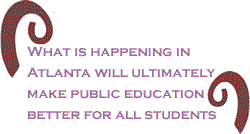|
In
what that is being described as possibly the worst cheating
scandal in the history of public education in the country,
the City of Atlanta
school system’s administrators and educators are now the
focus, accused of widespread deception and corruption.  Georgia
Governor Nathan Deal produced in a report, findings contained
within volumes of 800 pages, with accusations of system
wide cheating throughout schools and the administration
of yearly high-stakes testing. It is very clear that the
system and the tests, designed to measure educational development,
continues to have systemic and fundamental flaws. The reality
of the report that saddens me the most is that the majority
of the schools and teachers in the allegations are in poverty-stricken
areas, and are minorities. Georgia
Governor Nathan Deal produced in a report, findings contained
within volumes of 800 pages, with accusations of system
wide cheating throughout schools and the administration
of yearly high-stakes testing. It is very clear that the
system and the tests, designed to measure educational development,
continues to have systemic and fundamental flaws. The reality
of the report that saddens me the most is that the majority
of the schools and teachers in the allegations are in poverty-stricken
areas, and are minorities.
Contained
in the Governor’s scathing report, almost 200 employees
of the Atlanta School System are implicated in the cheating
scandal. Accusations range from providing students with
correct answers to having erasure parties at houses to correct
such tests. Teachers and others say that an environment
of high pressure was created to increase and sustain higher
test scores and they are the actual victims. The fact of
the matter remains that the real victims who have been cheated
are the students of the system and our society at large.
The first question to me becomes what and who is really
at stake in high-stakes testing?
Be
that as it may, the phrase “high stakes” is derived from
a gambling term. In gambling, a stake is the quantity
of money or other goods that is risked on the outcome of
some specific event. A high-stakes game is one in which,
in the player’s personal opinion, a quantity of money is
being risked. It is interesting to me that monetary bonuses
were being given under the guise of an improved school system
that I believe contributed to the aforementioned environment
of pressure among system employees. I maintain that anytime
you associate monetary value to accountability, an atmosphere
of dishonesty will be fostered.
The
scandal in Atlanta continues to grow and is providing a
catalyst for conversations in many school systems and communities
across the country that include ethics, morality and the
thermometers by which intellectual growth is gauged. The
second question then becomes, who are the actual stake holders?
In an abundance of caution, I would venture to suggest
that a test may be “high-stakes” based on consequences for
others beyond the individual test-taker.  At
the end of any sentence there has got to be some punctuation
mark or personal accountability, no pun intended! At
the end of any sentence there has got to be some punctuation
mark or personal accountability, no pun intended!
What
is happening currently in Atlanta
places a blemish, perhaps not permanent, on institutions
and the concept of public education. An optimist by nature,
I suggest that one can always find good, no matter how bad
the situation. I am a proud product of the Atlanta Public School system, a host of teachers
and a family of educators. I certainly believe that you
cannot, “throw the baby out with the bathwater,”
and so stands the case with regard to public education.
I am therefore optimistic that what is happening in Atlanta
will ultimately make public education better for all students
around the world in the final analysis and resolution. Perhaps
Marion Edelman placed it best, “The future which we hold
in trust for our own children will be shaped by our fairness
to other people’s children.” She further pressed that “Education
is for improving the lives of others and for leaving your
community and world better than you found it.”
BlackCommentator.com Guest Commentator, The Reverend D. D. Prather, is a noted
Civil/Social Justice Activist and a native
of Atlanta, GA. Click here
to contact the Reverend Prather.


|

